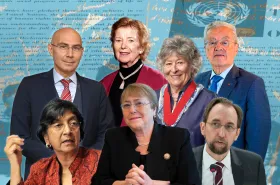
In the last 12 months, we’ve had a number of milestone anniversaries: 75 years of the Universal Declaration of Human Rights in December 2023, this year, the 75th anniversary of the Geneva Conventions and of the Council of Europe, a body born of the hope to create a peaceful, rights-respecting Europe.
Last year the Inside Geneva podcast devoted a whole series to the universal declaration, with in-depth interviews with all those who have held the post of UN Human Rights Commissioner.
75 years of human rights: what’s to celebrate?
They described the challenges they faced, from Rwanda to Bosnia, Syria or Ukraine, and yet they still held firm to their belief that human rights can be upheld, and that the treaties and conventions we have adopted to protect them are relevant and useful.
What a difference a year can make. Although the foundations have been shaking for a while (two permanent members of the UN Security Council, Russia and China, have been the subject of highly critical UN reports on their human rights record, and Russia’s president Vladimir Putin has been indicted by the International Criminal Court), the events of the last 12 months seem to have blown a massive hole through our human rights structure.
The most basic tenets of international law – do not deliberately attack civilians – have been ignored by all sides in the Middle East. In Gaza, Israel has been requested, begged, and finally told by the International Court of Justice to allow more humanitarian aid into a population on the verge of starvation, to no avail.
In the United States, we could be in for a turbulent few years. Donald Trump has promised ‘mass deportations’ of illegal immigrants, apparently disregarding the violations such an operation might entail. He has also promised an immediate end to the war in Ukraine, though he has not explained how that can be achieved while still recognising that Russia’s invasion was a clear violation of the UN Charter.
Many in Europe are wondering whether the new administration in Washington is committed to international law, and to human rights, or even whether they understand these fundamental principles.
And what about Europe?
So where does that leave Europe? Is it an increasingly weak continent, unable to stand up for the human rights principles it was, after the horrors of the second world war, so instrumental in creating? Or can it defend them?
This week Inside Geneva is in Strasbourg, home to the Council of Europe, for those anniversary celebrations. But is there much to celebrate? Michael O’Flaherty, the council’s Human Rights Commissioner, was not in an especially celebratory mood.
“We’re at a precarious time for human rights,” he told me. “Not only are violations deplorable in so many different places, but there is a repudiation of rights today. There’s an increasing willingness, even in this, let’s call it the ‘respectable political space’, to say ‘if human rights get in my way, it has to get out of my way’. This is very worrying.”
That was a view shared by others gathered in Strasbourg to mark the anniversary. Olof Skoog, the EU’s special representative for human rights, regretted what he saw as backsliding on the commitments of 1949. “For many, human rights are a bit of an afterthought in our policy. It’s something to make us feel good about ourselves,” he said.
Soul-searching
Skoog rightly reminded his audience that some of the most egregious human rights violations the world has ever seen were carried out by Europeans – from slavery to the Holocaust. The continent, he suggested, has nothing to be complacent about and certainly nothing to be superior about.
Instead, both he and others in Strasbourg, including Peggy Hicks from the UN Human Rights Office, suggested some soul-searching and a thorough examination of how human rights officials deliver their message.
“We’ve dropped the ball at times in terms of how we’ve delivered on that message,” said Hicks. “We have the laws, but are they really delivering for people in the way that they need to? And I think part of what we need to do better is making those connections.”
But what are the connections? In Europe, and in the United States, the populist narrative about human rights often sounds like an us-and-them equation – if we respect the rights of others, we lose something.
Hicks argues that the economic case for human rights needs to be made, that respect for them contributes to both global and national stability and security. There, O’Flaherty is in agreement.
“We can’t just say, ‘Do it because it’s a human right’ or ‘Do it because it’s in a treaty’. We have to demonstrate: ‘Do it, and this is how it will make your society better and stronger’,” he told Inside Geneva.
“That’s the way I talk to governments about the way we securitise our borders. I say, ‘If you have a humane reception policy at your border, you genuinely consider asylum claims, you’ll actually have more secure borders’”.
Precious but fragile
So, can Europe defend what O’Flaherty described as our ‘precious but fragile’ human rights conventions and treaties? One heartening aspect of the Strasbourg anniversary was the presence of young people from universities and colleges across Europe, all conscious of the threats to the system that gave them a childhood lived in stability and in peace.
Skoog urged them to hold their governments’ ‘feet to the fire’ over human rights commitments. And O’Flaherty reminded them of a call by the late French diplomat and writer Stephane Hessel, who urged citizens to “get angry” about attacks on international law and human rights.
“I’m not going to accept defeatism,” O’Flaherty told me. “Get furious – that’s what we need to do now. Don’t throw in the towel, don’t surrender. Get indignant, get furious and fight back to save this astonishing achievement.”
“I think we can hold the line,” he insisted. “We’re going to have a rocky few years, but with vigilance and with a sense of what could be lost, and with a refusal to yield, we can achieve a lot.”
For more on whether Europe can defend those cherished fundamental values, join us on Inside Geneva.


